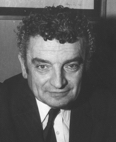Juan Obiols (Spain)

Biographical Sketch
Joan Obiols Vié was born in Granollers (Barcelona) in 1919. He enrolled in medicine at the Universitat Autònoma de Barcelona when he was only 16. Despite having to interrupt his studies because of the Spanish Civil War (1936-1939), Obiols was able to graduate in 1943 thanks to special provisions that allowed him to complete two years in one. He became involved with psychiatry from very early on.
A first-rate clinician, Obiols aquired his first skills at the Mental Institute of Santa Creu, complemented his training with prominent neurologists Barraquer (Sant Pau Hospital) and Subirana (Sagrat Cor Hospital), and in 1951 became Chief clinician at the Psychiatric University Clinic of Hospital Clinico y Provincial de Barcelona. He collaborated with Prof. Ramon Sarro in both clinical and academic activities. In 1958 he received his PhD by adressing the complex topic of the intelligibility of the schizophrenic delusion from a phenomenological perspective in a dissertation later published as “The case of Julia”.
In 1970 he was appointed professor of psychiatry at the University of Santiago de Compostela. In 1971, following Sarro's retirement ,he returned to Barcelona, where as director of the Department of Psychiatry and Medical Psychology he led a period of intense clinical, teaching and research activities. His open and innovating spirit prompted him to embrace everyone from psychoanalysts to behaviorists and systemic therapists, as he took an interest in any approach that might increase the scientific body of psychiatry. In this regard, it is worth highlighting that, after his early interest in the German phenomenological tradition, Obiols sought to establish the field as a fully scientific discipline and became a proponent of “biological” psychiatry. His pioneering role within this thriving field established him as a champion of the movement and a leader of both Spanish and international scientific organisations. After the death of Rolando Fischer he was appointed president of the World Federation of Biological Psychiatry Societes that he had helped to create. As such, he organised in 1978 the II World Congress of Biological Psychiatry in Barcelona, providing the definitive boost to the historic change within psychiatry.
His academic vocation led to his becoming Dean of the Medical Department at the University of Barcelona from 1972 until 1977, at which time he was appointed President of the University. Thanks to his democratic and open spirit, he was able to successfully lead the institution during the particularly tumultuous years of the Spanish political transition from dictatorship to democracy. In 1977 he was also elected numerary member of Barcelona's Royal Academy of Medicine.
Joan Obiols was, furthermore, a humanist. In the field of psychiatry, his interest in biology did not prevent him from being a pioneer in introducing techniques from psychodrama, art therapy or music therapy. These varied interests reflected his intense engagement with the world of arts and culture. An art collector and patron, he enjoyed the friendship of numerous artists, playwrights, musicians and intellectuals from all backgrounds. His untimely death, in 1980, befell upon him precisely while visiting the home of Salvador Dali, who was both his friend and patient.
